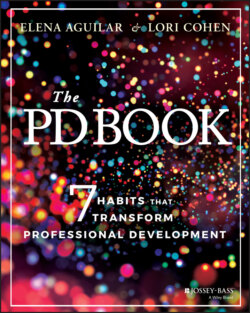Читать книгу The PD Book - Elena Aguilar - Страница 15
Refining the Definition
ОглавлениеCan you recall a PD session you attended in which you felt, during the session or by the end of it, that you had changed? That you had new insights into yourself, your students, or your situation? That you had acquired new skills?
Can you recall another PD session that you attended where perhaps you felt ambivalent about in the moment but later the ideas from that session percolated into your mind? Maybe those ideas prompted you to try something different at work?
Elena recalls a slew of PD experiences as a teacher that resulted in her growth and development: a district‐wide August training for 300 third‐grade teachers on a new math curriculum during which she spent days exploring manipulatives and being a “student” as a master teacher demonstrated the lessons; a series of arts integration PD sessions in which Elena was given time to plan lessons and get feedback on how she had incorporated the arts; a two‐year teacher inquiry project in which Elena did action research in her classroom. Each of these learning experiences changed, and improved, what Elena did as a teacher.
In contrast, Elena also remembers other so‐called PD sessions that she was asked to attend, from which she walked away mumbling something like, “a total waste of time.”
We've all attended meetings that were called PD in which the facilitator clicked through a massive slide deck, shared too much background, disconnected data, and a few dictionary definitions, and gave mandates. We may have taken in the information and complied with the mandates, but there was no learning going on inside of us. Perhaps it appeared that our behavior changed—we did what we were told. But we did so out of compliance and fear of repercussions, not because we'd learned and grown. Those meetings, therefore, were not professional development.
Let's stop using the term PD when what happens doesn't involve learning.
